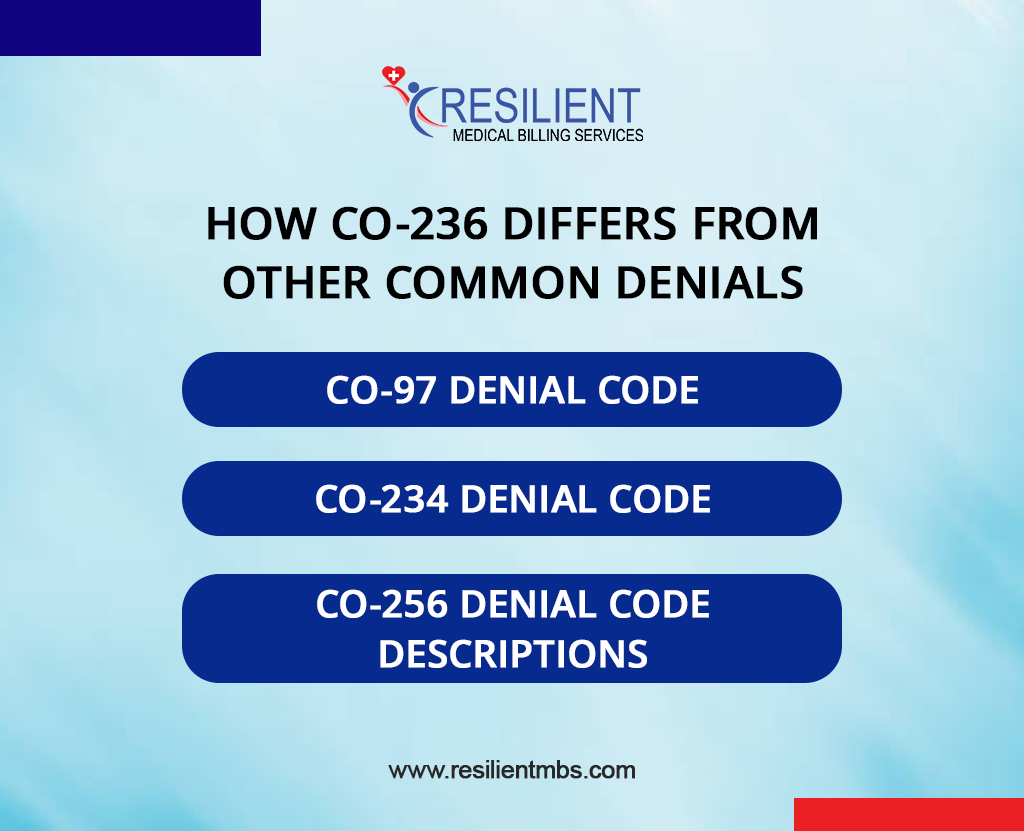Claim denials are one of the biggest challenges in medical billing. They delay payments, increase administrative work, and disrupt a healthcare practice’s cash flow. Each denial includes a specific code that explains the reason for the rejection.
Understanding these denial codes, such as the CO-236 denial code, CO-97 denial code, CO-234 denial code, and CO-256 denial code descriptions, helps billing teams fix issues faster and submit clean claims.
The CO-236 denial code occurs when a claim should be billed to a different insurance payer. This typically involves patients with multiple insurance plans, making Coordination of Benefits (COB) essential. In this updated and expanded guide, we break down what CO-236 means, why it happens, and how to resolve and prevent it with confidence, plus actionable tips to strengthen your revenue cycle.
What Is the CO-236 Denial Code?
CO-236 Denial Code Description
The CO-236 denial code indicates that the claim was submitted to the wrong insurance payer. The insurer you billed is informing you that another insurance plan is responsible for payment and must be billed first. This is a classic Coordination of Benefits (COB) issue.
In simpler terms:
You billed the wrong insurance, and the claim must go to the correct primary payer before processing.
How CO-236 Differs From Other Common Denials
Understanding the difference between denial codes helps billing teams correct claims efficiently:
CO-97 Denial Code
CO-97 means the claim was denied because the service is not covered or benefits are exhausted. This has nothing to do with multiple insurers.
CO-234 Denial Code
This denial occurs due to duplicate claims. CO-236 is not about duplicates but about the payer order.
CO-256 Denial Code Descriptions
CO-256 usually means the claim has missing, incomplete, or incorrect information, such as wrong patient details or invalid insurance info.
Key Takeaway
CO-236 is exclusively related to payer responsibility and COB order, not coding mistakes or duplicate submissions.
Why CO-236 Denials Matter
A CO-236 denial disrupts the revenue cycle by delaying payment and adding unnecessary administrative work. If unaddressed, it can lead to:
- Payment delays
- Increased rework and staff time
- Higher accounts receivable (A/R) days
- Repeated denials
- Potential write-offs if not corrected in time
Fixing these issues quickly is essential for keeping claims flowing smoothly and protecting your revenue.
Common Reasons for CO-236 Denials
1. Wrong Primary Payer Submitted
One of the most frequent causes is billing the secondary or tertiary insurance first, instead of the primary payer. This often happens when:
- The patient fails to provide updated insurance details
- The billing team is unaware of recent insurance changes
- Coverage coordination is handled incorrectly
Submitting to the wrong payer always results in an immediate denial.
2. Coverage Errors
Coverage errors occur when the patient’s primary coverage is misidentified. For example:
- A patient has both employer insurance and Medicare
- A dependent has dual coverage through two parents
- A patient recently switched plans
If the provider doesn’t identify the correct primary payer, CO-236 denials are guaranteed.
3. Missing or Incorrect Insurance Information
Insurance details must be complete and accurate. Common issues include:
- Wrong policy numbers
- Incorrect subscriber ID
- Outdated plan information
- Missing COB updates
- Incorrect coordination sequencing
Even a single inaccurate detail can trigger a denial.
4. Coordination of Benefits (COB) Issues
When multiple insurance plans are active, COB determines the exact order of payment. CO-236 denials happen when:
- COB was not verified
- Insurers have outdated information
- Patients did not verify insurance
- Billing teams skip COB confirmation steps
Maintaining updated COB details is essential for clean claims.
5. Timely Updates Not Maintained
Patients frequently experience changes in coverage due to:
- New employment
- Marriage or divorce
- Adding dependents
- Switching to Medicare
- Policy terminations
If the billing team doesn’t update insurance details on time, claims get sent to the wrong payer and are denied under CO-236.
How to Resolve CO-236 Denials (Step-by-Step Guide)
Fixing CO-236 denials quickly helps maintain cash flow and prevents rework. Here’s the proper workflow:
Step 1: Review the EOB or ERA
Start by reviewing the Explanation of Benefits (EOB) or Electronic Remittance Advice (ERA) to confirm the denial reason. Look for exact wording like:
- “Submit claim to primary payer”
- “Another insurer responsible for payment”
Step 2: Identify the Primary Insurance
Before resubmitting, verify:
- Active primary insurance
- Secondary or tertiary coverage
- Policy start and end dates
- Subscriber relationship
- COB hierarchy
Use online eligibility portals or clearinghouse verification tools for accuracy.
Step 3: Correct and Resubmit the Claim
Once the correct payer is identified:
- Update insurance information in the system
- Make necessary demographic corrections
- Attach the required COB documents
- Include the primary payer EOB (if resubmitting to secondary)
- Submit the corrected claim

Step 4: Contact the Payers if Needed
Sometimes, CO-236 involves conflicting payer information. Contacting both insurance companies helps clarify:
- Which payer is primary
- Whether COB updates are needed
- Policy coordination rules
Document all communications for future reference.
Step 5: Keep Detailed Records
Maintain a log of:
- Denial reason
- Date of correction
- Payer communication
- Resubmission date
- Final outcome
These records help avoid repeated errors.
How to Prevent CO-236 Denials
Prevention is key to maintaining low denial rates and healthy revenue.
1. Verify Insurance for Every Visit
Always verify:
- Active plans
- COB details
- Plan hierarchy
- Subscriber status
- Coverage rules
Real-time eligibility verification tools make this process faster.
2. Follow Insurer COB Rules Strictly
Every payer has unique COB guidelines. Ensure your billing team understands:
- Medicare COB
- Medicaid payer-of-last-resort rules
- Dependent coverage rules
- Employer vs. government plan coordination
- Auto or workers’ comp primary handling
Correct COB handling dramatically reduces CO-236 denials.
3. Update Patient Records Regularly
Ask patients during every visit:
- Have you changed jobs?
- Do you have new insurance?
- Did you switch plans?
- Is anyone else covering you?
This keeps records current.
4. Identify Patterns in Denials
Review denial reports to identify:
- Recurring CO-236 trends
- Department-specific errors
- Payer-specific COB problems
- Staff training needs
Analytics tools help catch issues early.
5. Train Billing Staff on COB Denials
Your billing team should be fully trained on denial codes like:
- CO-236 denial code
- CO-234 denial code
- CO-256 denial code descriptions
- CO-97 denial code
Knowledgeable staff = fewer denials.
Final Thoughts
The CO-236 denial code is a common COB-related denial that occurs when a claim is submitted to the wrong insurance payer. Fixing and preventing these denials requires accurate insurance verification, strict COB compliance, and staff training.
By identifying the correct primary payer, correcting claim details, and resubmitting properly, providers can avoid payment delays and reduce administrative rework.
If CO-236 denials are affecting your revenue cycle, partnering with experts can make a significant difference.
Need Help With CO-236 or Other Denials?
Resilient MBS specializes in fast, accurate denial management, including COB issues like CO-236, coverage errors like CO-97, duplicate denials like CO-234, and documentation-based rejections such as CO-256.
- Faster claim correction
- Clean claim submissions
- Accurate COB validation
- Improved revenue cycle performance
Get expert support today. Keep your claims clean and your cash flow strong. Contact Resilient MBS today for complete denial management solutions.
FAQs
What does the CO-236 Denial Code mean?
CO-236 means the claim was denied because another insurance company should pay first. It indicates a Coordination of Benefits issue.
How is CO-236 different from CO-97 and CO-234?
CO-236 is about primary payer mismatch, CO-97 involves non-covered services, and CO-234 is a duplicate claim.
What causes CO-236 denials?
Wrong primary payer billed, outdated insurance info, missing COB updates, or eligibility errors.
How can CO-236 denials be fixed?
Verify the correct primary payer, update insurance details, attach required COB documents, and resubmit the claim.
How can CO-236 denials be prevented?
Verify insurance before each visit, maintain updated COB records, follow payer rules, and train billing staff regularly.










